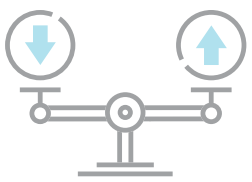When selecting an internet service plan for your business, there’s a lot to consider and broadband jargon can be confusing.
As a business owner, you know how important fast speeds and reliability are. Here is a quick rundown to help you make an informed decision about your business’ connection needs.
What is high speed internet?
“High-speed internet” is a term used for internet service that is faster than traditional dial-up analog connections of the past. The different delivery methods for high-speed internet include dedicated fiber access or fiber via PON (passive optical network), copper (including coax or xDSL), wireless, and satellite. The amount of bandwidth available determines how fast data can either be downloaded or uploaded through the broadband connection.
Bandwidth vs. speed
While the terms bandwidth and speed are often used interchangeably, they’re not the same. Whether you have a 50Mbps or a 1Gig fiber connection, packets of data travel to your business at the same speed. The difference is that, with the 1Gbps internet, you can receive 20 times the number of data packets—making your capacity to receive data (bandwidth) much larger.
Download vs. upload
Download speed is a term used to describe how quickly your device can receive (download) data over the internet.
Upload speed is a term used to describe the speed your device is capable of sending (uploading) the information via the internet. Common examples are accessing pages via logins or sending passwords when logging on to an email account.
Upload speeds may be less important than download speeds for your customers, but they continue to grow in importance for businesses. This is because most businesses today struggle with large file transfers and advanced cloud-based services. A fast upload speed allows you to send large documents to the cloud quickly and collaborate in video chats with minimal lag.
Asymmetrical vs. Symmetrical bandwidth
Congratulations, you now know the difference between upload and download speeds! Now that you know which speed to prioritize, the type of bandwidth you select comes into focus.
Asymmetrical bandwidth provides a higher download speed than upload speed. Access providers choose this so they can dedicate more bandwidth downstream for faster downloads. This is true for almost all services delivered by copper networks.
Symmetrical bandwidth provides the same upload speed as download speed. Fiber is the best delivery method for symmetrical service. Increased upload speeds continue to grow in importance, and symmetrical bandwidth is great for businesses that rely on the internet for uploading large files, creating and sharing content, and for places that have many employees and customers sharing the same network.
Why fiber?
The reason to upgrade to fiber from copper or any other delivery method is clear—it’s the best delivery platform for high speed internet services and consistently performs the best.
- Scalable service. Because fiber is light wave, there is very little signal loss allowing for higher speeds at greater distances than copper services. There are also greater broadband options, and fiber can be increased up to 10Gbps.
- Symmetrical speeds. No copper-based service can match the symmetrical speeds provided by fiber.
- More reliable. Businesses that run on fiber have connections that are resistant to electromagnetic and radio-frequency interference, crosstalk, extreme temperatures, moisture, power surges, and other harmful conditions.
- More secure. Because your signal is transmitted through glass, it’s less susceptible to tapping and other security threats.
- Dedicated fiber access. Fiber-based dedicated internet access (DIA) has historically offered the most bandwidth flexibility and operational stability. It can be provisioned to carry voice, voice and data, Voice over Internet Protocol (VoIP), private line ethernet transport, or only your internet access. To fit the needs of your business, there are bandwidth options from 50Mbps to 10Gbps.
For more information on how high-speed internet from TDS can help improve your business, call 844-483-7249.

No comments yet.